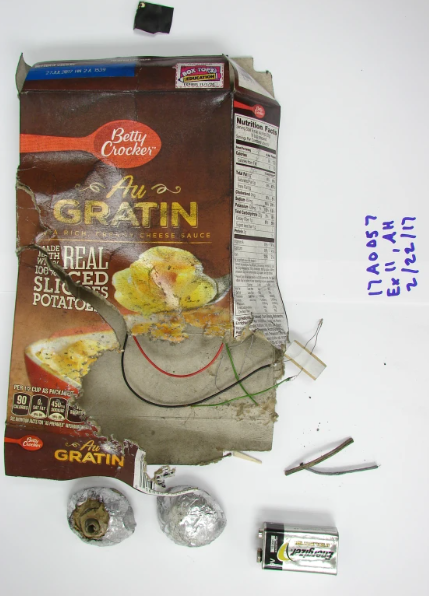The Worst Way to Target a Lower Stock Price?
If you’re looking for stock advice, well, this is the wrong email newsletter for you. Nothing you’ll read here is investment advice — especially not the tactic that Mark Barnett used in 2017.
Barnett, like many other would-be investors, knew that there was one basic principle behind any sort of strategy: buy low, sell high. The problem with that strategy, though, is that you need to know if the stock price is going to go up or down, and that’s easier said than done. But Barnett had a plan — and not one you should replicate. This, via NBC News, is what it looked like:

The picture features a box of Betty Crocker potatoes in some sort of cheese sauce, a bunch of wires, a battery, and some balls of something wrapped in aluminum foil. Taken together, the stuff above is, according to the federal government, a bomb, “the resulting fire and explosion from each of the devices would have been capable of causing property damage, serious injury, and death.” And Barnett had made ten of these bombs concealed in boxes of pasta, stuffing mix, and yes, au gratin potatoes.
His goal wasn’t to murder people; according to MassLive, he told his apparent co-conspirator that his explosive devices won’t kill people but will “just take your hand off.” Rather, Barnett was just looking to profit off of other people’s misery — and the panic of investors. Barnett’s plan was to enlist a friend to drive from Syracuse, New York to his own home state of Florida, placing these devices on the shelves in Target stores up and down the east coast of the United States. With bombs going off at seemingly random Target stores, Barnett surmised, investors in the company would sell their shares, allowing Barnett to buy them at a discount. And once he owned a lot of shares, he could simply stop blowing things up, wait for the stock price to recover, and rake in a nice profit.
The plan, thankfully, never came to fruition — in larger part because Barnett was already a scofflaw. According to the government press release linked above, Barnett “had been conditionally released from state prison in 2013, following multiple felony convictions for sexual assault, kidnapping, and grand theft.” And as part of that release, he was unable to travel outside of a predefined range and wear an ankle monitor. So Barnett offered a friend $10,000 to place the bombs for him. That friend — who was also on probation, having been previously convicted of burglary — decided he didn’t want to go back to jail. So, rather than implicate himself in an interstate crime spree, he went to the authorities.
The bombs never made it to Target. Barnett was convicted of attempted arson and a handful of lesser crimes and, in October of 2018, sentenced to 40 years in prison for his crimes. And to add insult to injury, had he just invested in Target and not tried to manipulate the stock price, he would have done just fine for himself: in January of 2017, just before he concocted the plan, the stock was selling at about $64 a share; today, even after a rough few months, it’s trading at over $150 per share.
Bonus fact: If you’re shopping at Target and you see an item with a price ending with a four (e.g. $3.84), you’ll probably not find it cheaper — at least, not at that Target store. According to Reader’s Digest, “Items with prices ending in $0.09 are the regular price, items with prices ending in $0.06 or $0.08 are discounted and will be marked down again during the next markdown cycle as long as there is inventory in the store,” and items with prices ending in $0.04 are the final clearance price.
From the Archives: Targeting Crime: Maybe Target could have solved the Barnett case itself?
